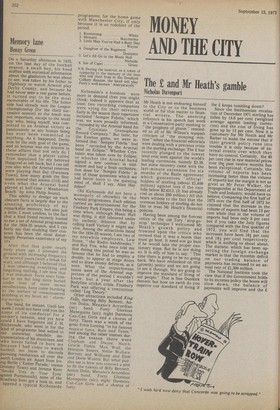MONEY AND THE CITY
The t and Mr Heath's gamble
Nicholas Davenport
Mr Heath is not endearing himself to the City or to the business world or for that matter to financial writers. The sneering reference in his speech last week at a Conservative party meeting to "the prophets of gloom" reminded us all of Mr Wilson's waspish criticism of "the moaning minflies " when the financial editorials were dealing with a previous crisis in the sterling exchange. The E has recently plunged to the lowest level ever seen against the world's leading currencies, namely $2.38, but some recovery came with the last-minute extension for six months of the Basle agreement which guarantees ' official ' holders of sterling (about £1,800 million) against loss if the rate falls below $2.4313. (It has already cost us about £60 million.) All this bears witness to the fact that the overseas holders of sterling do not like or trust Mr Heath's financial policies.
Having been among the fiercest critics of the old Tory ' stop-gostop ' technique I welcomed Mr Heath's growth policy and frowned upon the critics who crowed that it was a boom that must go bust. It need not go bust if he would take the proper cautionary steps. But he is not doing so. It is silly of him to say: "This time there is going to be no going back. We have embarked, on this (growth) policy and we are going to see it through. We are going to improve the standard of living of our people." That is fine Dunkirk rhetoric but how on earth do you 'improve our standard of living if
the £ keeps tumbling down?
Since the Smithsonian revaluation of December 1971 sterling has fallen by 18.6 per cent (weighted average against leading currencies) and the cost of living has gone up by 13 per cent. Now it is customary for Mr Heath and Mr Barber to make the excuse that if their growth policy runs into trouble it is only because of external events over which they have no control. Certainly, the 40 per cent rise in raw material prices over the past twelve months has been exceptional. Certainly, the volume of exports has been increasing faster than the volume of imports but the margin is not as great as Mr Peter Walker, the propagandist at the Department of Trade and Industry, would have us believe. Comparing the first half of 1973 over the first half of 1972 he claimed that the increase in the volume of exports had been 13 per cent while that in the volume of imports had been only 8 per cent but if you take the July figures compared with the first quarter of 1972, you will find that the increases have been 18/ per cent and 16/ per cent respectively, which is nothing to shout about. The statistic which has been upsetting the foreign exchange market is that the monthly deficit on our trading balance of payments has increased to an annual rate of £1,300 million.
The National Institute took the view that if the Government holds to its incomes policy the boom will slow down, the balance of payments will improve and the £
































 Previous page
Previous page